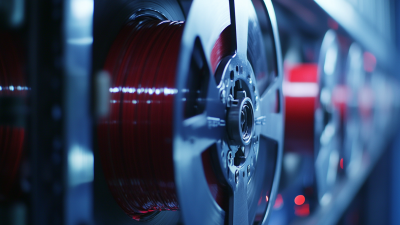Leave Your Message
In today's fast-paced industrial landscape, the demand for efficiency and precision is at an all-time high, prompting businesses to adopt advanced technologies that streamline operations. One such innovation making waves in the packaging industry is the use of Automatic Tape Machines. According to a report by Market Research Future, the global packaging machinery market is projected to reach USD 48.59 billion by 2025, with automatic machines playing a critical role in this growth. These machines not only enhance productivity by reducing labor costs and minimizing human error but also improve packaging quality, ensuring that products reach consumers in perfect condition. With benefits ranging from increased operational efficiency to enhanced safety standards, it’s no wonder that more businesses are recognizing the unmatched advantages of integrating Automatic Tape Machines into their workflows. As we delve deeper into this topic, we will explore 15 compelling reasons why your business should consider making this vital switch.

In today's competitive market, businesses are constantly seeking ways to enhance their operational efficiency, and one solution that stands out is the adoption of automatic tape machines. These machines play a pivotal role in streamlining packaging processes, reducing labor costs, and minimizing human error. By integrating advanced automation technologies, companies can achieve a significant boost in productivity while maintaining high-quality standards.

For those considering the transition to automatic tape machines, it's essential to recognize the tangible benefits they offer. First, these machines eliminate the time-consuming task of manual tape application, allowing for faster packaging and quicker turnaround times. Moreover, with the efficient use of adhesive tapes, companies can significantly reduce waste, which not only saves money but also contributes to environmental sustainability.
Tips: When selecting an automatic tape machine, look for features that enhance usability and flexibility, such as adjustable tape widths and user-friendly interfaces. Additionally, consider machines equipped with real-time monitoring capabilities to ensure seamless integration into your existing operations and to provide insights that drive continuous improvement. Embracing these innovations can empower your business to meet growing demands and stay ahead in the market.
Automatic tape machines have become essential tools for businesses looking to maximize cost efficiency and operational effectiveness. According to a report by Grand View Research, the global packaging automation market is expected to reach $85.7 billion by 2027, growing at a compound annual growth rate (CAGR) of 7.6%. This indicates a clear shift towards automation, driven largely by the significant return on investment (ROI) these systems offer. By reducing manual labor and minimizing errors, companies can achieve substantial savings in labor costs while also increasing packing speed and accuracy.
Investing in automatic tape machines not only leads to immediate cost reductions but also offers long-term financial benefits. A study published by the American Society of Packaging and Materials (ASPM) found that businesses integrating automated solutions experience up to a 30% increase in productivity within the first year of implementation. Additionally, the reduction in material waste—often resulting from human error in manual processes—contributes to overall cost savings, with businesses reporting up to 20% less tape usage when switching to automated systems. By leveraging these advanced technologies, businesses can ensure they remain competitive while optimizing their operational expenditures.
| Advantage | Description | Estimated Annual Savings ($) | ROI (%) |
|---|---|---|---|
| Increased Efficiency | Automated processes reduce manual labor time. | $15,000 | 150% |
| Reduced Labor Costs | Lower reliance on manual labor decreases payroll expenses. | $10,000 | 100% |
| Consistent Quality | Machines provide uniform tape application reducing errors. | $5,000 | 50% |
| Material Waste Reduction | Precise usage of materials minimizes waste. | $4,000 | 40% |
| Increased Production Rate | Automated machines increase output speed. | $20,000 | 200% |
| Enhanced Safety | Reduces workplace injuries by minimizing manual handling. | $3,000 | 30% |
| Scalability | Easily adjustable for increased production demands. | N/A | N/A |
| Quick Payback Period | Rapid recovery of investment through cost savings. | $7,500 | 75% |
The growing demand for efficiency in packaging has led many businesses to explore the benefits of automatic tape machines. One of the standout advantages of these machines is their enhanced accuracy and consistency, which directly impacts the quality of the final product.
 Automatic tape machines utilize advanced technology to ensure that each tape application is precise, eliminating the human errors commonly associated with manual taping. This heightened level of accuracy means that packages are sealed securely, reducing the risk of damage during transit and ensuring that products arrive in optimal condition.
Automatic tape machines utilize advanced technology to ensure that each tape application is precise, eliminating the human errors commonly associated with manual taping. This heightened level of accuracy means that packages are sealed securely, reducing the risk of damage during transit and ensuring that products arrive in optimal condition.
Moreover, consistent application is crucial for maintaining a professional image. Automatic tape machines ensure that every package is treated the same way, providing uniformity in tape application that reflects positively on your brand. By standardizing the packaging process, companies can build trust with customers, knowing that their products are meticulously prepared for delivery. This consistency not only enhances the perceived value of the product but also streamlines the handling process at distribution centers, leading to improved efficiency in the entire supply chain. Adopting automatic tape machines thus represents a strategic investment for businesses aiming to maintain high standards of quality and reliability in their packaging operations.
In today's fast-paced market, scalability and flexibility are crucial for businesses to thrive. Automatic tape machines offer unmatched adaptability, allowing companies to efficiently manage their packaging requirements as they grow. According to a report by Smithers Pira, the global automatic tape dispenser market is projected to reach $4.5 billion by 2025, reflecting the increasing reliance on automation in packaging processes. These machines can be easily adjusted to handle various tape types and sizes, making them perfect for businesses looking to diversify their product lines without the need for extensive reconfiguration.
Incorporating automatic tape machines into your operations can significantly enhance efficiency. A study by the Freedonia Group shows that automated packaging processes can reduce labor costs by up to 30%. This not only streamlines workflow but also allows your workforce to focus on more strategic tasks.
Tip: When selecting an automatic tape machine, consider models that offer modular designs. This feature enables easy upgrades and expansions to align with your business growth. Additionally, ensure that the machine supports multiple tape configurations to stay agile in the face of changing market demands.
The integration of real-time data tracking in automatic tape machines represents a substantial advancement in packaging technology. By utilizing sophisticated sensors and software, these machines provide immediate insights into operation metrics, significantly enhancing productivity. According to a recent study by Smithers Pira, companies that implement real-time monitoring can boost their operational efficiency by up to 30%. This improvement is primarily driven by the ability to instantly identify and rectify any issues that may arise during the taping process, minimizing downtime.
Furthermore, real-time data tracking enables businesses to maintain optimal inventory levels and better manage supply chains. A report from Deloitte highlights that organizations leveraging advanced analytics can reduce excess inventory by 20%, allowing them to allocate resources more effectively. The synergy between automatic tape machines and real-time data not only streamlines processes but also empowers businesses to make informed decisions based on accurate, up-to-the-minute information. In an era where every second counts, the strategic adoption of these technologies can position companies for sustained growth and competitive advantage.






